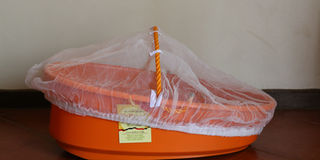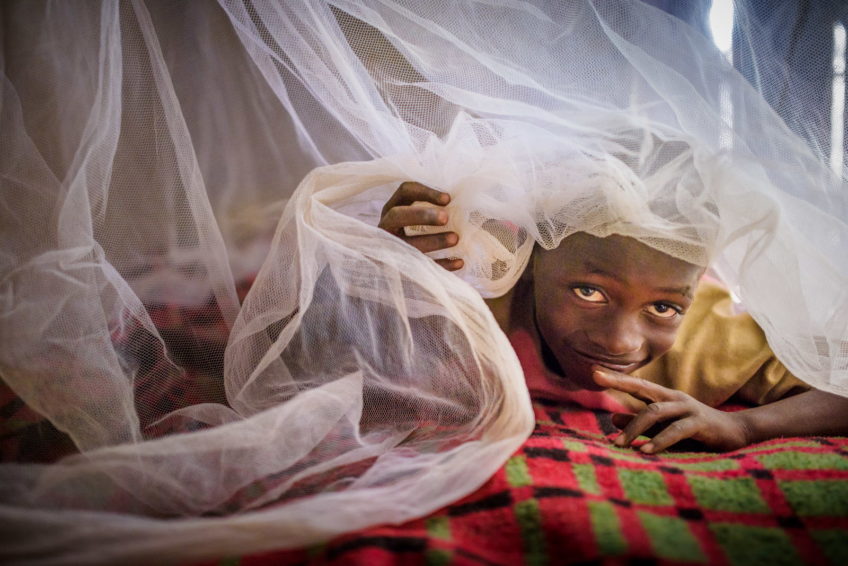Biodegradable crib to protect babies from malaria

A kokono crib which is made out from biodegradable materials and is produced and distributed locally. PHOTO/ BETTY NDAGIRE
What you need to know:
Designed in Italy and made in Uganda, the cradle has been been co-created together with end-users and protects babies from 0 to 12 months (in night and day-time) from animal attacks, co-sleeping practices (causing suffocation) and accidental hits in off-grid areas
Malaria is the leading cause of death among under five-year old children in Uganda according to the World Health Organisation 2011 report, and is responsible for 20 per cent of infant deaths.The only tool to limit malaria is the use of mosquito net, which reduces its spread up to 63 per cent.
For this reason, innovators have manufactured the first biodegradable crib dubbed Kokono. It is covered with mosquito net, washable and frugal, so as to be financially accessible to low income communities in need of safe space for babies during night and day.
In Uganda, mosquito nets are mainly used by adults and only indirectly used by infants through the practice of bed sharing, often causing baby suffocation and crushing.
Dr Lucia Dal Negro, the founder and director of the Kokono baby crib, says if it is scaled, it will increase local employment, engage women distributors and most curb infant mortality rates by providing a safe space for babies living in need, both in rural and poor urban areas of Sub-Saharan Africa, precisely Uganda.
Where the health census revealed that 13 percent of households have mosquito nets and only 8 percent of the children under five years use one.
Designed in Italy and made in Uganda, the cradle has been been co-created together with end-users and protects babies from 0 to 12 months (in night and day-time) from animal attacks, co-sleeping practices (causing suffocation) and accidental hits in off-grid areas.
“It is made out from biodegradable materials and is produced and distributed locally, thanks to a network of women selling it to poor communities and refugees. It has been patented to prevent fake items and reduce infant death rates in vulnerable communities,” Dr Dal Negro says.
She explains that it is a cradle born from the desire not to have to choose between reducing pollution or saving lives, but to prioritise both. They wanted to tackle these by generating a product that is sustainable and socially impactful and that is how the baby crib came to her mind.
Dr Dal Negro says Kokono crib was born to prove that it is possible to do ethical business in Africa with Africa, without necessarily relying on emergency aid, which at times creates dependency, or massive investments, which often destroy the environment.
“Kokono crib is a product that includes a polymer master batch that enhances the end-of-life biodegradability of plastic and maintains the same properties as regular plastic: the shelf life, appearance, recyclability, clarity, and strength. Kokono was done after we run different focus groups in Fort Portal, Hoima, Gulu and Kampala by engaging different local groups more than 200 people and we asked them, how they would like this crib to be. They gave us a lot of feedback on the usages,materials and the shape. We collected everything to produce this product,” she explains.
However, once the product is discarded into a landfill or ends up in the ocean or under soil, the naturally occurring microbes in those environments utilise the plastic as a food and energy source, accelerating the bio degradation process.
What used to take thousands of years, now takes only a few years as microbes consume the entire product.
The only thing that remains are the same byproducts as humus, water, Carbondioxide and Methane that can be captured to produce clean energy.
Dr Dal Negro also notes that the cribs business model is inclusive. They designed different ways to distribute the cribs, either business-to-business or business to consumer.
They will rely on partners to engage their beneficiaries as distributors and to include Kokono cribs within their grants. They have partnerships with Ugandan distributors a side being sold online.
But there are many things that have “Just think of the pandemic, Kokono was supposed to be distributed in March 2020 when in Italy closed everything. We are currently paying a tax on Kokono’s plastic shell that affects each piece by almost a dollar, despite ours being a green material. We are currently paying VAT as if we were selling hairbrushes instead of a protective product for babies,” she says.
Mr John Mutebe, the programme manager, Federation of Small and Medium Enterprises (FSME), says they decided to first test the product in Uganda, as they want to see maternal health improved in this ecosystem and also realised that it is environmentally friendly and can also create jobs.





